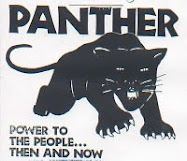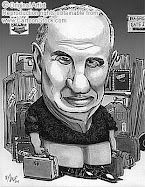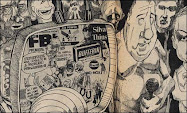 By Graeme Wood
By Graeme Woodcorrespondents.theatlantic.com
Jul 18 2009
ASUNCION -- Mengele grew up in Guenzburg, Bavaria. Guenzburg is the present-day site of Legoland Deutschland and is just a couple hundred miles from the ancestral hometown of Alfredo Stroessner. Stroessner, a year younger than Mengele, was born to a Bavarian immigrant father in Paraguay, and by the time Mengele arrived to settle in Paraguay permanent, he had ruled the country for nearly five years. Mengele thought a fellow fascist Teuton might see his flight from justice sympathetically. He was right.
I've come to the Paraguayan terror archives in Asuncion to examine the documents of Mengele's stay. The terror archives, a few small rooms on the ground floor, a thin wall away from the Palace of Justice's loading dock, exist mostly to document Stroessner's own extensive evils committed between 1954 and 1989. Stroessner employed a large corps of informants whom Paraguayans came to call piragues: in Guarani, "the hairy-footed," for the soft footfall that meant they could be lurking around any corner at any time. (Another Guarani name was "the wet-noses," for their ability to sniff out treason with sensitivity that matched the wet nose of a bloodhound.)
The documents describe a regime long toppled and repudiated, but they remain soaked in paranoia, and the natural instinct when reading these informants' reports is to look over one's shoulder. Bureaucrats sent in reports of Argentine lefties who may or may not have been massing along the border, and of Korean eccentrics who lived in jungle shacks and who may or may not have been feeding messages to Kim Il Sung. Most messages, though, concern Paraguayans themselves -- anyone remotely suspected of disloyalty faced interrogation -- and how best to make troublesome ones disappear. In retrospect few of these reports make sense (North Koreans in the Paraguayan jungle? What could they possibly want?), and the archive reads like a vast clinical document, evidence of a institution-wide neurosis.
It would probably take a defect in the Paraguayan government at least that serious to produce the document I found marked 809, concerning one "Jose Mengele," applying under his own (almost) name for Paraguayan citizenship in 1959. It is two pages long, and it resides in a leatherbound volume that the archivist produced quickly and with professional pride. Typed and stamped, the document attests to Mengele's good character, his solvency, and his having fulfilled all the requirements for citizenship. His backers were Werner Jung and Alexander (here "Alejandro") von Eckstein, both prominent Nazis. The paper states at least one obvious falsehood -- that Mengele had resided in Paraguay for the requisite five years already -- but that seems not to have fazed the three senior magistrates who signed it, signaling that with no objection they naturalized Josef Mengele as a Paraguayan citizen in 1959.
Mengele's Paraguayan citizenship has been known for decades. It was often mentioned during Stroessner's regime as evidence of the country's unfitness for full membership in the community of nations. (Once Mengele's citizenship became known, Stroessner was typically bullheaded and territorial, saying that Paraguay would never extradite any of its own people, and that any state that objected would be meddling in Paraguayan affairs.) To see it here, though, certified as one of not terribly many actions that the court took during that term, is to understand how deliberately Paraguay must have welcomed Mengele. There were not many petitioners for citizenship, and it is said that Stroessner himself kept tabs on who was applying. Stroessner was no Nazi, but he was a natural-born autocrat and brute. It is easy to imagine that even if he cared little for Mengele and knew nothing of his crimes, he would have enjoyed burnishing a reputation as an unmoveable force in the center of the continent, doing as he pleases with no concern for world opinion.
Still, among these papers filled with whispers of implausible North Korean espionage and leftist disloyalty, the Mengele document possesses an unnerving concreteness. The secret police suspected criminals and traitors were hiding everywhere, but here is one piece of paper that, a fib or two aside, is brazen and open in its injustice. When Mengele filed it he knew he could toss it on the top of the heap of the Paraguayan republic's grisly bureaucratic paperwork, and the near-certain outcome would be or approval from the high court and possibly the dictator himself. That piece of paper, matter-of-fact and bearing Mengele's own distinctive surname, might be one of the creepiest documents in the room.
http://correspondents.theatlantic.com/graeme_wood/2009/07/jose_mengele_paraguayan.html




